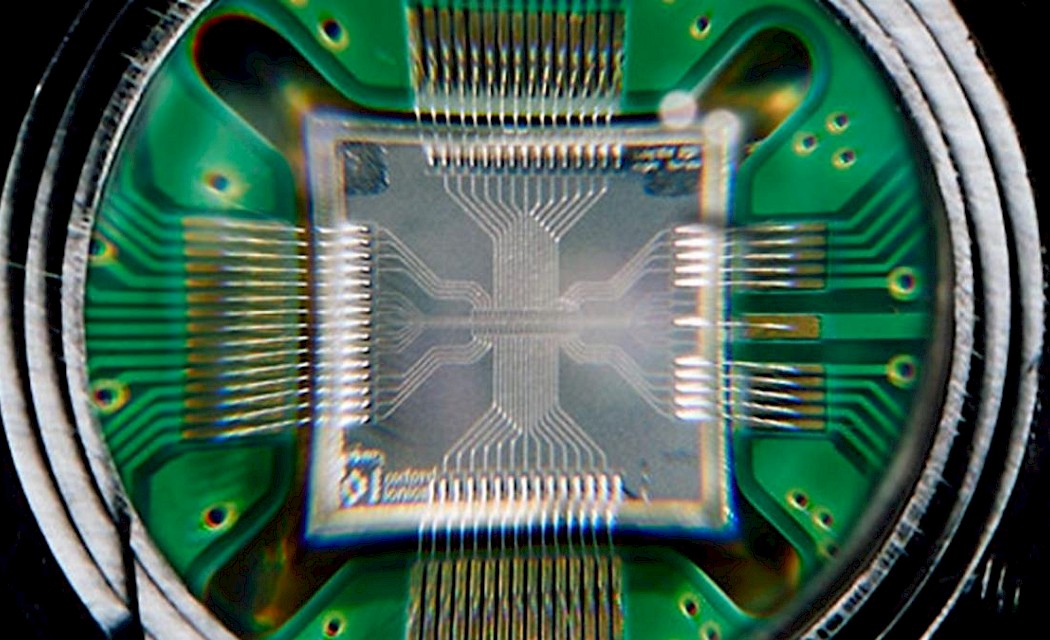Oxford Ionics has demonstrated the highest performing quantum chip in the world, which can be produced at scale in a standard semiconductor fabrication plant.
Building stable, high-performance quantum computers is hugely challenging. It demands the creation of high-performance qubits and a way to control those qubits in a scalable way.
Only one technology - trapped ions - has demonstrated the performance needed to build a useful quantum computer. However, until now, trapped ions have been difficult to scale as they are typically controlled by lasers.
Oxford Ionics has eliminated the need to use lasers to control qubits through the development of a patented Electronic Qubit Control system. This unique, embedded approach takes the highest performing qubit technology - trapped ions - and integrates everything needed to control them into a silicon chip that can be mass-produced using standard semiconductor manufacturing facilities and processes.
Building a useful quantum computer requires high performing single and two-qubit gate operations. Oxford Ionics’ significantly increased qubit performance means that powerful quantum computers can be built with far fewer qubits and that valuable commercial applications can be deployed before needing to implement complex and costly error correction techniques.
Together with the scalability of Oxford Ionics’ approach, these results indicate the dawn of useful quantum computing is far closer than previously thought. With proven engineering, Oxford Ionics will now build a scalable 256 qubit chip that can be manufactured on existing semiconductor production lines.
Dr Michael Cuthbert, Director of the UK’s National Quantum Computing Centre, said: “The new results mark a pivotal step forwards in ion trap quantum computing and validates the scalability of the technology.
The reported one and two qubit gate results outperform other players’ achievements to date, meaning error correction becomes achievable with minimal overheads. This performance underpins the proprietary architecture Oxford Ionics will deliver to the National Quantum Computing Centre as part of our Quantum Computing Testbed procurement and we are really excited to see both how this will be deployed, and how we will be able to use these ultra-high performance qubits for the development of algorithms and new applications.”
Dr Chris Ballance, co-founder and CEO of Oxford Ionics, said: “The industry’s biggest players have taken different paths towards the goal of making quantum computing a reality. From the outset, we have taken a ‘rocket ship’ approach - focusing on building robust technology by solving the really difficult challenges first. This has meant using novel physics and smart engineering to develop scalable, high performance qubit chips that do not need error correction to get to useful applications, and can be controlled on a classic semiconductor chip. Since we started in 2019, we have hit every target on our roadmap on time and today’s results validate our confidence in our approach. We are now able to focus on the commercialisation of our technology and delivering useful quantum computing at scale.”
Dr Tom Harty, co-founder and CTO at Oxford Ionics, said: “When you build a quantum computer, performance is as important as size - increasing the number of qubits means nothing if they do not produce accurate results. We have now proven that our approach has delivered the highest level of performance in quantum computing to date, and is now at the level required to start unlocking the commercial impact of quantum computing. This is an incredibly exciting moment for our team, and for the positive impact that quantum computing will have on society at large.”
About Oxford Ionics:
Oxford Ionics was co-founded in 2019 by Dr Tom Harty and Dr Chris Ballance who both hold world records in quantum breakthroughs. The team includes 55 global experts across physics, quantum architecture, engineering and software and expects to triple headcount over the next three years as the business scales internationally. Oxford Ionics has raised £37 million to date with investors including Braavos, OSE, Lansdowne Partners, Prosus Ventures, 2xN, and Hermann Hauser (founder of chip giant ARM). Oxford Ionics has an R&D partnership with Infineon Technologies AG. In February 2024 Oxford Ionics won the contract to produce Quartet, a full-stack quantum computer for the UK’s National Quantum Computing Centre.
For more information please visit https://www.oxionics.com/
Image provided by Oxford Ionics
